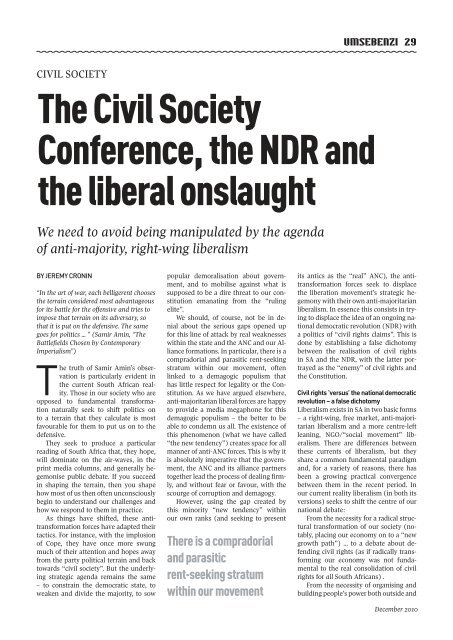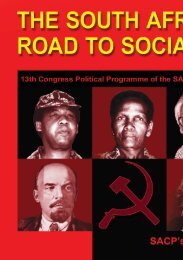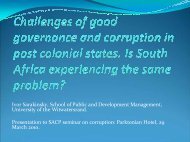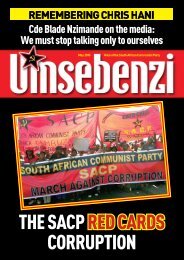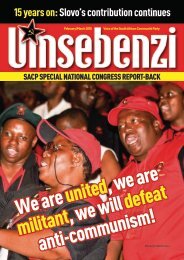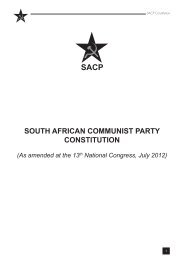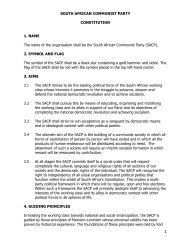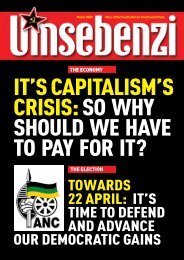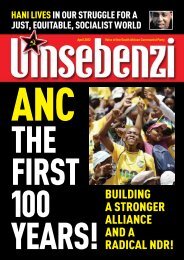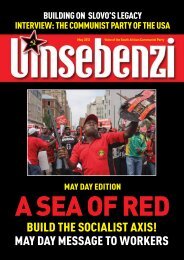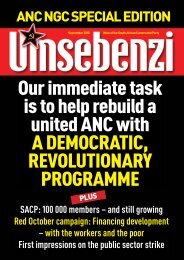YCL CONGRESS EDITION - South African Communist Party
YCL CONGRESS EDITION - South African Communist Party
YCL CONGRESS EDITION - South African Communist Party
Create successful ePaper yourself
Turn your PDF publications into a flip-book with our unique Google optimized e-Paper software.
CIVIL SOCIETY<br />
The Civil Society<br />
Conference, the NDR and<br />
the liberal onslaught<br />
We need to avoid being manipulated by the agenda<br />
of anti-majority, right-wing liberalism<br />
BY JEREMY CRONIN<br />
“In the art of war, each belligerent chooses<br />
the terrain considered most advantageous<br />
for its battle for the offensive and tries to<br />
impose that terrain on its adversary, so<br />
that it is put on the defensive. The same<br />
goes for politics ... ” (Samir Amin, “The<br />
Battlefields Chosen by Contemporary<br />
Imperialism”)<br />
The truth of Samir Amin’s observation<br />
is particularly evident in<br />
the current <strong>South</strong> <strong>African</strong> reality.<br />
Those in our society who are<br />
opposed to fundamental transformation<br />
naturally seek to shift politics on<br />
to a terrain that they calculate is most<br />
favourable for them to put us on to the<br />
defensive.<br />
They seek to produce a particular<br />
reading of <strong>South</strong> Africa that, they hope,<br />
will dominate on the air-waves, in the<br />
print media columns, and generally hegemonise<br />
public debate. If you succeed<br />
in shaping the terrain, then you shape<br />
how most of us then often unconsciously<br />
begin to understand our challenges and<br />
how we respond to them in practice.<br />
As things have shifted, these antitransformation<br />
forces have adapted their<br />
tactics. For instance, with the implosion<br />
of Cope, they have once more swung<br />
much of their attention and hopes away<br />
from the party political terrain and back<br />
towards “civil society”. But the underlying<br />
strategic agenda remains the same<br />
– to constrain the democratic state, to<br />
weaken and divide the majority, to sow<br />
popular demoralisation about government,<br />
and to mobilise against what is<br />
supposed to be a dire threat to our constitution<br />
emanating from the “ruling<br />
elite”.<br />
We should, of course, not be in denial<br />
about the serious gaps opened up<br />
for this line of attack by real weaknesses<br />
within the state and the ANC and our Alliance<br />
formations. In particular, there is a<br />
compradorial and parasitic rent-seeking<br />
stratum within our movement, often<br />
linked to a demagogic populism that<br />
has little respect for legality or the Constitution.<br />
As we have argued elsewhere,<br />
anti-majoritarian liberal forces are happy<br />
to provide a media megaphone for this<br />
demagogic populism – the better to be<br />
able to condemn us all. The existence of<br />
this phenomenon (what we have called<br />
“the new tendency”) creates space for all<br />
manner of anti-ANC forces. This is why it<br />
is absolutely imperative that the government,<br />
the ANC and its alliance partners<br />
together lead the process of dealing firmly,<br />
and without fear or favour, with the<br />
scourge of corruption and demagogy.<br />
However, using the gap created by<br />
this minority “new tendency” within<br />
our own ranks (and seeking to present<br />
There is a compradorial<br />
and parasitic<br />
rent-seeking stratum<br />
within our movement<br />
its antics as the “real” ANC), the antitransformation<br />
forces seek to displace<br />
the liberation movement’s strategic hegemony<br />
with their own anti-majoritarian<br />
liberalism. In essence this consists in trying<br />
to displace the idea of an ongoing national<br />
democratic revolution (NDR) with<br />
a politics of “civil rights claims”. This is<br />
done by establishing a false dichotomy<br />
between the realisation of civil rights<br />
in SA and the NDR, with the latter portrayed<br />
as the “enemy” of civil rights and<br />
the Constitution.<br />
Civil rights ‘versus’ the national democratic<br />
revolution – a false dichotomy<br />
Liberalism exists in SA in two basic forms<br />
– a right-wing, free market, anti-majoritarian<br />
liberalism and a more centre-left<br />
leaning, NGO/“social movement” liberalism.<br />
There are differences between<br />
these currents of liberalism, but they<br />
share a common fundamental paradigm<br />
and, for a variety of reasons, there has<br />
been a growing practical convergence<br />
between them in the recent period. In<br />
our current reality liberalism (in both its<br />
versions) seeks to shift the centre of our<br />
national debate:<br />
From the necessity for a radical structural<br />
transformation of our society (notably,<br />
placing our economy on to a “new<br />
growth path”) ... to a debate about defending<br />
civil rights (as if radically transforming<br />
our economy was not fundamental<br />
to the real consolidation of civil<br />
rights for all <strong>South</strong> <strong>African</strong>s) .<br />
From the necessity of organising and<br />
building people’s power both outside and<br />
December 2010


